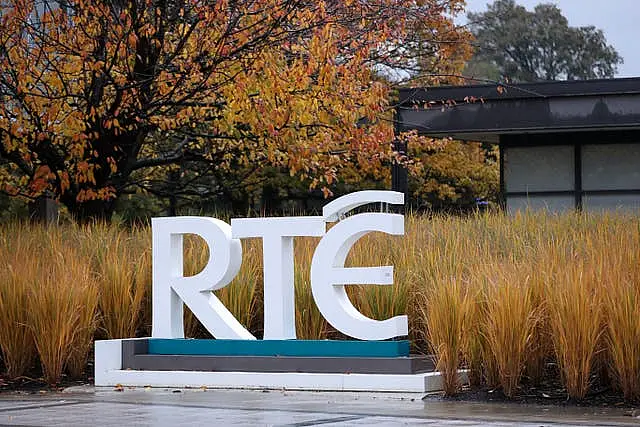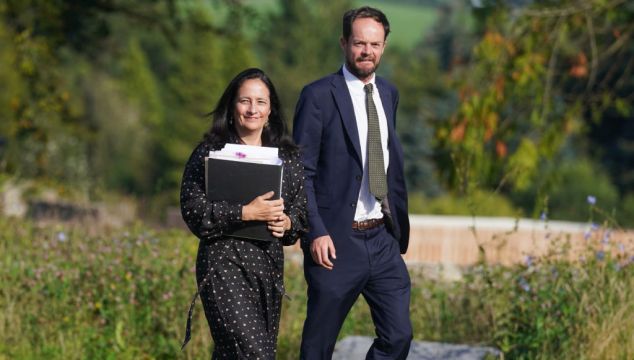The Government has said requests from RTÉ for interim funding would be “interrogated” before a final decision is made on what the broadcaster should be allocated.
The Taoiseach and Minister for Media doubled down on requesting that RTÉ deliver “concrete reform” to rebuild trust as part of a long-term funding model.
Both Leo Varadkar and Catherine Martin repeated commitments that the government would provide a solution to the question of a funding model, but the Taoiseach said it was not sustainable for the vast majority of public service media funding to go to RTÉ.
“I know some of it doesn’t at the moment, there is a broadcasting fund, but the vast majority of it does, and I don’t think that’s entirely right in a modern era,” he said.

“There should be a greater degree of competition for what is ultimately public money.
“So we need to decide very clearly what we’re going to fund and then have a mechanism by which there’s greater opportunities for other media organisations to apply for that funding and compete for it.”
Ms Martin delivered an update to Cabinet on Wednesday on the financial and governance difficulties facing the national broadcaster.
It included figures in the RTÉ annual report for 2022, published on Wednesday, showing the broadcaster incurred a deficit of 2.8 million euro last year – a €5.2 million decline compared to a surplus of €2.4 million in 2021.
Ms Martin confirmed that prior to the controversies, RTÉ had asked for €34.5 million in interim funding, and on Monday received a letter projecting a further loss of €21 million by year-end due to a fall in TV licence payments.
The figures from RTÉ have been referred to the state financial advisory body NewERA.
She said that interim funding for RTÉ had been agreed as part of the Future Of Media Commission report but the exact amount had not been decided.
“Again, you’re seeing the figure of (€55.5 million) but NewERA would have to interrogate that… That does not mean that’s the figure that we’re considering right now,” she said.
She said that reforms would be needed from RTÉ as part of the long-term funding model.
“We need to see more of the cost-saving measures, for example the commitment in relation to presenters’ pay, we need to see more like the register of interests.”
Mr Varadkar said any additional funding would be conditional on the contents of the national broadcaster’s strategic plan for reform.
“I think everyone understands that there will be additional funding required, but it has to be conditional.
“And we’re not going to be in a position as a Government to allocate any additional funding to RTÉ until we’ve seen the director general’s new strategy and a strategic plan for RTÉ, and we expect to see that some time in October, because we believe that the public won’t accept additional taxpayers’ money being provided to RTÉ without a reform programme and one that’s being implemented.
“I think the vast majority of the public do value what RTÉ does, in terms of news, in terms of funding Irish drama, children’s programming, Irish language programming.
“That’s why most people do pay the TV licence and I encourage people to continue to do so.
“But I don’t think that the Irish public would accept a financial bailout of RTÉ with no strings attached. There have to be strings attached, it has to be conditional and that’s why we’re not in a position to sign off on something like that until we’ve seen the new strategy and the reform plan from RTÉ which is due next month.
“It’s not just about fixing the irregularities that may have happened in the past around barter accounts and so on. It’s about modernising and reforming the organisation, an organisation that we need and that we value.
“So before we can agree any additional funding, we’re going to need to see that new strategy and that new reform plan.”
He added of RTE’s reform plan: “This isn’t something that has to be sorted out on Budget Day. This is something that has to be sorted out in this financial year, but it doesn’t have to be on Budget Day.”
A controversy engulfed the national broadcaster in June after revelations about the under-reporting of the salary paid to star presenter Ryan Tubridy. The row triggered a multi-million euro drop-off in the collection of TV licence revenue.
A report from the state’s financial advisory body NewEra into the broadcaster’s latest funding requirements is expected to be delivered to Ms Martin in two weeks’ time.
The Mazars final report will be delivered in October, and the six-month reviews into governance and culture at RTÉ will be finalised in January.
A Grant Thornton report on The Toy Show musical is to be delivered in October, and the voluntary exit report is to be delivered towards the end of September and the first week of October.







